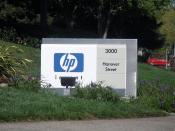IntroductionIn the beginning of the company's history the founders did not focus on growth per se, but focused instead on manufacturing quality products. Choosing not to compete on price, the company concentrated on developing advanced products adapted to customers' needs. In 1957 the company was divisionalized along product lines in an attempt to decrease spans of control and to simulate the ideal aspects of small business units within a global corporation. They planned to give considerable operating freedom to the managers of these business units, but to do so within a set of commercial and management guidelines.
Over the last twenty-five years Hewlett Packard has grown at least tenfold. In retrospect, current senior management believe that culturally they had become both complacent and paternalistic, and an implicit policy of no redundancy had become established in the minds of employees. However, by the late 1980s Hewlett Packard faced the same difficulties as its competitors, including increased competition; sluggish markets, decreasing profitability, and a declining stock market valuation.
Yet by February of 1994, the group was recording a 41 per cent rise in first-quarter net profits. In 1993 the UK subsidiary increased its turnover by 43 per cent, generating profits of $85 million compared with a break-even position in 1992.
A number of factors appear to have contributed to this turnaround. Apart from market changes, new product launches, and cost-cutting measures, the level of bureaucracy within the company was also attacked. A company that had been started by entrepreneurial engineers, advisers urged that it had become too centralized. In addition, new ideas were being squashed if they appeared too unorthodox. Hewlett Packard's response was to return to a decentralized structure that gave freedom back to the individual business units. This decentralization arguably helped one business division to take off in business terms...


